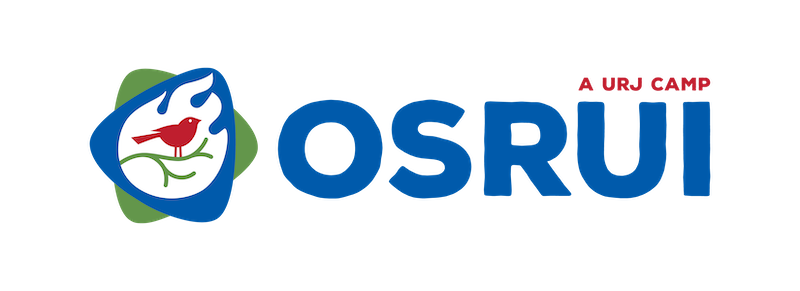By Rabbi Taron Tachman, Mosh Segel (Faculty), Rabbi Ari Naveh and Rokki Parrinello, Gesher Segel
What in part makes summer camp so special is that urban and suburban kids get to experience and appreciate the great outdoors. The last two weeks at Olin Sang Ruby Union Institute, two eidot (units) of camp, Moshavah and Gesher, have been learning about Judaism’s mandate to cherish and protect God’s world and have also studied the Jewish midda (value) of Derech Eretz, community mindedness. For the passionate chanichim (campers) of OSRUI, however, it wasn’t enough to just enjoy being outside, nor was it enough to simply learn about making a positive difference for the environment. Our chaninchim wanted to take action and that’s just what they did! They brought their expectations for an even greener camp to the front door of Camp Director Solly Kane – in the form of a protest!
 In advance of the chanichim’s “sit-in” for a greener camp, the chanichim from Gesher and Moshavah drew up lists of ways camp could lessen the amount of waste produced and energy consumed and they came up with ideas how camp could further promote environmental awareness. The chanichim of Gesher even conducted interviews around camp of top leaders, researched and documented aspects of camp food, energy and water use that they thought could be made more sustainable, and they created graphs and charts to illustrate their findings. Once the camper’s ideas and data were collected and organized, they made colorful protest signs with used cardboard and poster-board, making use of the Jewish environmental texts they had learned as well as their own creative ideas. In addition, the campers conceived of and practiced various Jewish text inspired protest cheers, chants, and songs. They then designated spokespersons who would represent the group in the encounter with the Camp Director.
In advance of the chanichim’s “sit-in” for a greener camp, the chanichim from Gesher and Moshavah drew up lists of ways camp could lessen the amount of waste produced and energy consumed and they came up with ideas how camp could further promote environmental awareness. The chanichim of Gesher even conducted interviews around camp of top leaders, researched and documented aspects of camp food, energy and water use that they thought could be made more sustainable, and they created graphs and charts to illustrate their findings. Once the camper’s ideas and data were collected and organized, they made colorful protest signs with used cardboard and poster-board, making use of the Jewish environmental texts they had learned as well as their own creative ideas. In addition, the campers conceived of and practiced various Jewish text inspired protest cheers, chants, and songs. They then designated spokespersons who would represent the group in the encounter with the Camp Director.
Finally the moment of truth arrived! The groups were informed in advance where Solly Kane would be and as he approached, they belted out their songs, waved their signs and sang their hearts out. Solly couldn’t help but notice. How, the chanichim wondered, would he react? Would he be angry or disappointed? Would he argue with them, or worse, ignore them?
 Everyone breathed a sigh of relief when Solly (acting surprised), applauded their efforts and told the demonstrators that though the camp has made great strides in reducing its environmental footprint, OSRUI can still do better. We all can. He then encouraged the chanichim to share their findings and ideas. He validated the camper’s concerns, he asked them why protecting the environment was important to them as Jews and as people, and he asked the campers about the changes they have noticed at their home congregations and schools. Overall, it was a powerful, meaningful, relational encounter between the chanichim and camp leadership. What started with a few Jewish texts written on paper, turned into discussions, and then to actions that truly resonated. In the end, what the chanichim gleaned from protesting and standing up for their Jewish inspired convictions was a sense of being heard and valued, a feeling of empowerment and dignity and the knowledge that they are not alone in the effort to improve our camp and our world. In the struggle to protect and cherish our precious environment, the OSRUI chanichim now know they are working in collaboration with each other, with their favorite Jewish summer camp, and with God.
Everyone breathed a sigh of relief when Solly (acting surprised), applauded their efforts and told the demonstrators that though the camp has made great strides in reducing its environmental footprint, OSRUI can still do better. We all can. He then encouraged the chanichim to share their findings and ideas. He validated the camper’s concerns, he asked them why protecting the environment was important to them as Jews and as people, and he asked the campers about the changes they have noticed at their home congregations and schools. Overall, it was a powerful, meaningful, relational encounter between the chanichim and camp leadership. What started with a few Jewish texts written on paper, turned into discussions, and then to actions that truly resonated. In the end, what the chanichim gleaned from protesting and standing up for their Jewish inspired convictions was a sense of being heard and valued, a feeling of empowerment and dignity and the knowledge that they are not alone in the effort to improve our camp and our world. In the struggle to protect and cherish our precious environment, the OSRUI chanichim now know they are working in collaboration with each other, with their favorite Jewish summer camp, and with God.
Rabbi Taron Tachman serves as a Rabbi at Beth Tikvah Congregation in Hoffman Estates, Illinois. Rabbi Ari Naveh serves as the Senior Jewish Educator for the Hillel at the University of Illinois at Urbana-Champaign. Rokki Parrinello serves as an Educator at Beth Tikvah Congregation in Hoffman Estates, Illinois
